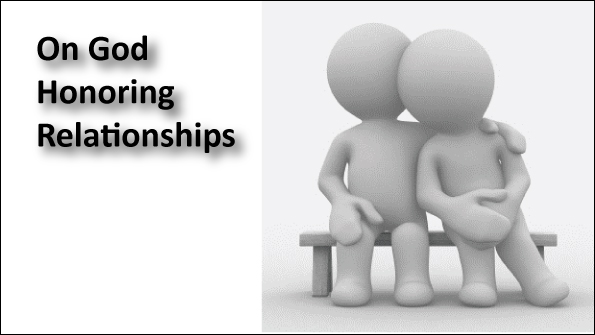By Tyson Thorne

This week leading up to Valentine's Day, and all next week seemed like the perfect time to talk about love and relationships. While it is natural to read these next series of posts with an eye toward one’s romantic interest, much of what is discussed here is true for any close relationship – best friend, parent, or significant other. Of course, there are some principles which apply exclusively to one kind of relationship as well, and these will be identified in the models we study.
Some principles which apply to all “good” relationships are:
• Forgiveness (Ephesians 4.32)
• Love (1 John 4.7-8)
• Listening (James 1.19)
• Encouraging/stimulating (Hebrews 10.24-.25)
• Serving (Galatians 5.13)
• Support (Galatians 6.2)
• Acceptance (Romans 15.7)
• Prayer (James 5.16)
• Accountability (Galatians 6.1)
Although not a definitive listing, any relationship which combines these elements will be a good and profitable relationship.
This raises another question: What are good relationships supposed to accomplish in one’s life? One author stated it this way:
There have been a number of times during the past years when one of my ‘children’ has come into the library, puttered around the bookshelves until we were alone, and then sat by my desk to talk about love… They really don’t want me to answer their questions, nor should I. If I have not already answered them ontologically nothing I say is going to make any sense… But over the years two questions of mine have evolved which makes sense to me. I ask the boy or girl how work is going: Are you functioning at a better level than usual? Do you find that you are getting more work done in less time? If you are, then I think that you can trust this love. If you find that you can’t work well, that you’re functioning under par, then I think something may be wrong. The other question I ask my ‘children’ is: what about your relations with the rest of the world? It’s all right in the very beginning for you to be the only two people in the world, but after that your ability to love should become greater and greater. If you find that you love lots more people than you ever did before, then I think that you can trust this love. If you find that you need to be exclusive, that you don’t like being around other people, then I think that something may be wrong.”
—Madeleine L’Engle, A Circle of Quiet, pg 109-110.
Or, to put it another way:
“Have you heard that new word ‘synergistic?’ It’s used by medical people to describe the action of certain drugs, especially among the antibiotics. These drugs have limited action when used alone. Yet surprisingly, when used in combination with certain other drugs, their action enlarges all out of proportion. Suddenly their effectiveness becomes geometric rather than arithmetic. Because they ‘work together’ with such power their relationship is called synergistic.”
—Joseph Bayly, When One Plus One Equals 22.
In short, good relationships enhance our person, motivate the good in us, and make us more effective in regard to our strengths. And this is exactly how God planned it to be. Tomorrow we’ll look at the world’s first romantic tragedy, Adam & Eve.
Click for the next article in this series: http://www.think-biblically.com/10-lucubrations/44-vw-adam-eve
|
|
|